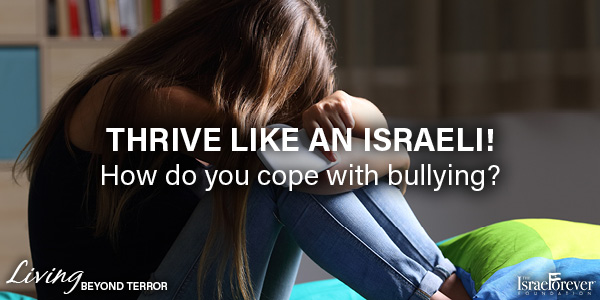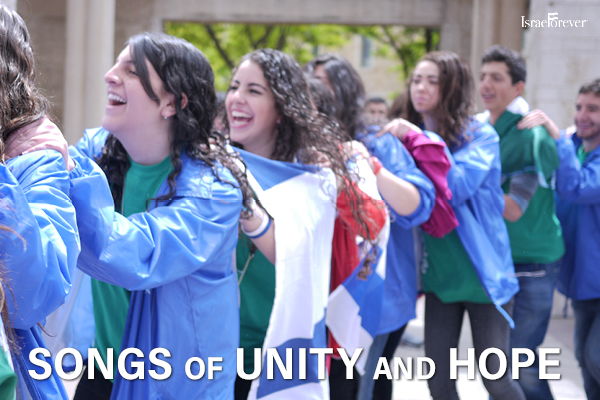Thrive Like an Israeli: How do you cope with bullying?
By Abby Chargo

This is a group activity appropriate for ages 13 and above.
ACTIVITY GOAL:
The activity is designed to raise awareness regarding coping methods in difficult situations such as bullying with the understanding that although we may not be able to control what happens to us, we can control our reactions to situations and this enables us to deal with challenges in a healthier more effective manner.
ACTIVITY OPTIONS:
Utilize the coping methods key below to facilitate an open discussion or follow the activity instructions to conduct the quiz and have the discussion at the end of the activity.
Trauma is a spectrum. At the extreme end we find post traumatic stress disorder (PTSD), at the low end of the spectrum we find temporary emotional imbalance due to an unpleasant experience.
Israelis are masters at coping with trauma, being resilient and thriving despite unpleasant and even very difficult, extreme circumstances. While we hope that most people will not experience the more extreme end of the trauma spectrum, unpleasant experiencing such as bullying are common and knowing how to cope helps us overcome the situation more easily and speedily.
Understanding our reactions and being aware of potential coping mechanism allows us to better control our reactions and overcome difficult situations. So what’s your Israeli coping mechanism?
What is your instinctive reaction to something bad that happens? What other reactions can you adopt to make your responses more effective and help yourself or your friends overcome difficult situations faster?
CHOOSE YOUR OWN SCENARIO (OPEN DISCUSSION):
Give a few examples of bullying and provide a few responses, allowing the group to choose the most appropriate coping method for this situation. What is your Israeli coping method (see the quiz key below)?
What do you do in stressful situations?
When you’re upset, are you more likely to punch a wall? Eat ice cream? Talk to a friend? Teach others to overcome what you overcame?
Answer key at the end to show which Israeli coping mechanism you best match with 5 types of coping categories:
1) Problem-focused
2) Emotion-focused
3) Accepting-focused
4) Avoidance-focused
5) Engagement-focused
SUPPLIES LIST (FOR TEACHER/INSTRUCTOR):
- Print a copy of the quiz for each participant
- Pencils / pens for each student
- Print 1 copy of the key and answer key for yourself
- Optional: slideshow of the answer key on your computer to display during concluding discussion and to be shared with all of the participants at end of quiz
QUIZ:
- Someone calls you a hurtful name. You respond by:
a. Reporting it to an authority figure
b. Talking it out with a friend
c. Walking away and letting it go
d. Walking away and avoiding the person completely from now on
e. Asking them how it would make them feel if they were called a hurtful name - Someone physically harms you. You respond by:
a. Physically harming them back
b. Reporting it to an authority figure
c. Walking away and letting it go
d. Staying as far away from the person as possible
e. Asking them why they harmed you - Someone body shames (ie calling you too skinny, too fat, etc.). You respond by:
a. Explain to them why what they said was hurtful and wrong
b. Cry to your parents about it
c. Shake it off and don’t let it bother you
d. Focus on enhancing your self-esteem and avoid the person
e. Asking them why they think their behavior is acceptable - Someone makes fun of your religion/beliefs. You respond by:
a. Asking questions back and engaging in debate
b. Emotional outburst and lashing out
c. Letting it process in your mind and not respond
d. Being snarky and sarcastic
e. Ask them why they feel the need to judge someone else’s beliefs - Someone touches you inappropriately without consent. You respond by:
a. Shoving them off of you and calling for help
b. Breaking down and crying
c. Doing nothing and saying nothing due to wanting to move forward and forget about it
d. Never coming near that person again
e. Engaging in a conversation about how sexual assault is NEVER okay and explaining why what they did was wrong - Someone physically harms your friend in front of you. You respond by:
a. Physically harming the bully back
b. Being a support system for your friend and helping however possible
c. Letting your friend handle it and try to forget what you saw
d. Trying to block the image out of your head and staying away from the assaulter
e. Approaching the bully and asking them why they would ever do such a thing - Someone cyber bullies you. You respond by:
a. Reporting it to an authority figure
b. Crying and talking it through with your parents
c. Reading the message and choosing not to respond
d. Blocking the bully on social media and avoiding them
e. Replying to them and explaining why bullying is inappropriate and hurtful - Your friend tells you that one of your close friends has been talking behind your back. You respond by:
a. Talking behind your close friend’s back
b. Having an emotional breakdown and seeking support from your parents
c. Letting it go and giving your close friend the benefit of the doubt
d. Cutting ties from your close friend and not speaking to him/her anymore
e. Approaching your close friend and asking if he/she has been talking behind your back - Your friends are purposefully excluding you from their plans. You respond by:
a. Excluding these same friends from your own plans
b. Being upset and talking it through with your parents or a trusted adult
c. Accepting that your friends want to hangout without you
d. Not being friends with these people anymore
e. Approaching your friends and asking why they may be excluding you - Someone verbally sexually harasses you. You respond by:
a. Yelling at them and calling for help
b. Running away and confiding in someone so you can process what happened
c. Coming to terms with the situation and trying to move forward
d. Avoiding that person and trying to distract your mind by watching a movie
e. Responding to them and explaining what they said is unacceptable and inappropriate
ANSWER KEY:
A - Problem-focused
B - Emotion-focused
C - Accepting-focused
D - Avoidance-focused
E - Engagement-focused
Add up how many A’s, B’s, C’s and D’s that you have selected and whichever letter you selected most often, THAT is your Israeli coping method. See below for your results:
A: You are Israeli assertive! More often than not, you confront the problem at hand and try to provide solutions. Typically, you will ask yourself, “What now?” instead of “Why me?” You are a true Israeli when it comes to coping with difficult situations!
B: You are Israeli emotional! Believe it or not, Israelis also have to process through tough situations and will utilize their support systems. You may find yourself talking to and/or spending more time with family and friends. You may also serve as a support system for others - Israelis jump at every opportunity to help their neighbors and communities around Israel (and the world, including in neighboring Arab countries!) who have endured a terror attack, such as helping with day-to-day activities that the victim may be temporarily incapable of. Similar to Israelis, you might also turn to humor in uncomfortable or hard scenarios.Your emotions are not something negative, they are a tool that help keep yourself healthy, self-aware and enable you to connect to others. Being able to express yourself in hard times (or conversely, allowing others to express themselves when they are having a hard time) is a very effective way to heal emotional pain and to create deeper friendships!
C: You, like Israelis, take things at face-value and can mostly accept or come to terms with the situation at hand. Rather than dwelling on the bad that has occurred, you recognize that what has happened is in the past and you will do all you can to move forward. Even when times are hard and you feel upset with what has happened, you learn to live with the situation, knowing what truly matters - your happiness, NOT dwelling on annoying people who did things that are unpleasant. You try to stay on track with your daily routine and keep your mind focused on what comes next.
D: If avoidance coping is your main mechanism, one may ask if you are afraid of conflict? Are you hesitant to enter into debate? What may be driving you in this direction? Not only Israelis, but all humans may do whatever possible to avoiding dealing with the issue at hand and try and fill their minds with other thoughts that do not cause them stress. Coping in this way is a short-term mechanism and could cause more stress for you down the road because you haven’t actually solved the problem or released the hurt feelings. Self-care and participating in distracting activities such as exercise, nutrition, skincare, etc is a positive thing but at the same time it is important not to allow your mind to fully block out what is bothering you. Trying looking at the other possible coping mechanisms and see which one might be easier for you to adopt so that you can find long term solutions to the challenges that are bothering you.
E: This is the most Israeli of reactions! You don’t let anyone get away with hurtful words or actions without engaging in a conversation or a debate with you. You seem to ask a lot of “Why?” and “How?” questions to make sure that whoever is speaking is sure that they REALLY meant what they said. You are strong in your beliefs, but you are open to hear other opinions without getting too worked up or defensive. You know that injustice needs to be stopped when it is small because otherwise it will grow and become a bigger issue down the road. It is better to nip problems in the bud while they are still small. Also, the best response to experiencing pain is turning around and helping others who are currently having the same experiences you had to overcome. Bad things happen sometimes but you have the power to make things easier from others based on the knowledge and understandings you gained from your personal experiences!








